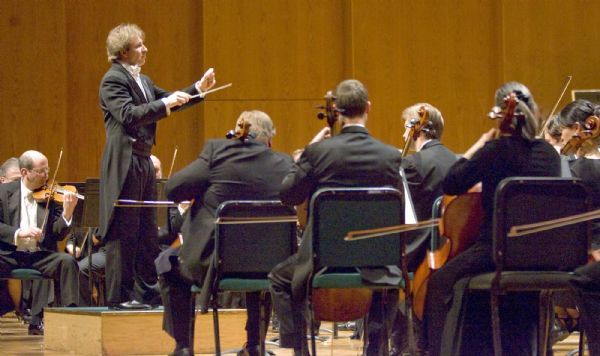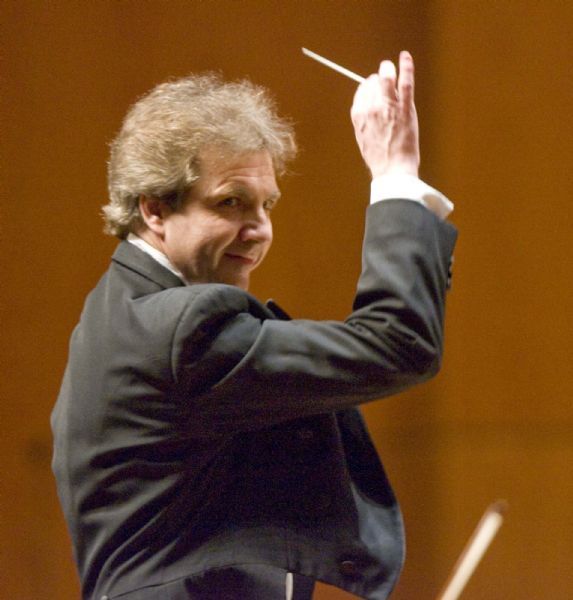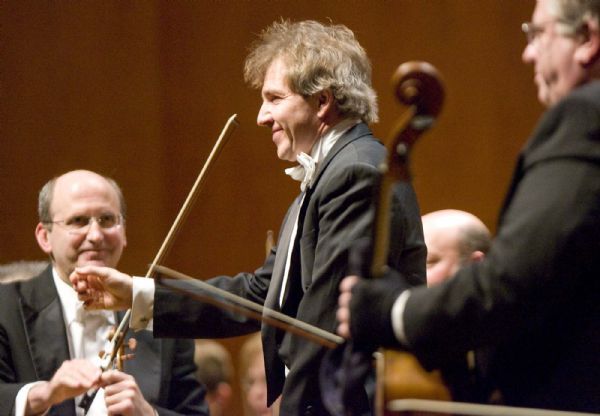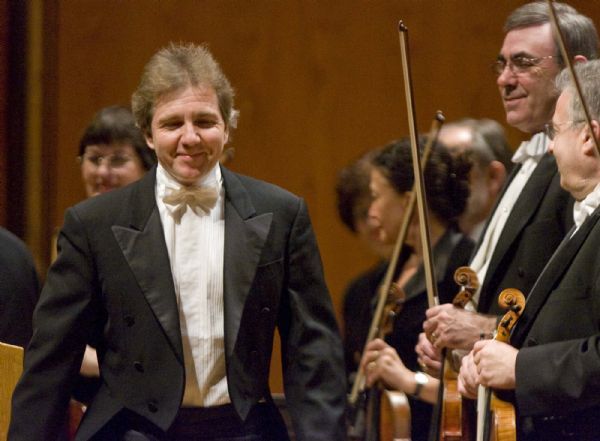This is an archived article that was published on sltrib.com in 2010, and information in the article may be outdated. It is provided only for personal research purposes and may not be reprinted.
New Utah Symphony music director Thierry Fischer says that when he conducts the orchestra, he'd like the audience to feel that "everything is possible in that moment." He speaks of music's "miraculous [ability] to keep us always in a state of waiting, of expectations."
His career has been marked by serendipity; he likes to say that he became a conductor by accident.
Yet for all Fischer's talk of spontaneity and surprise, it wasn't a shock to musicians or concertgoers when the orchestra hired the Swiss conductor as music director in September. He'd already won a following at Abravanel Hall in his two previous appearances there.
Fischer was an early favorite in the nearly three-year search to replace former music director Keith Lockhart, says longtime Utah Symphony violinist Barbara Scowcroft."I could say maybe the majority of the orchestra was pulling for [Fischer]," she said. "We felt an immediate camaraderie with him."
Principal trombonist Larry Zalkind, another orchestra veteran, has been a Fischer fan since day one. Zalkind is substituting this season with the Los Angeles Philharmonic, where dynamic Venezuelan conductor Gustavo Dudamel, 29, has become a media sensation in his first season as music director.
Zalkind finds Fischer's appointment equally exciting. "I still see him as a rising star," he said. "There are some great things about how he makes music that are going to be recognized."
Fischer's background is unconventional. He spent his first six years "in the middle of nowhere, in very natural surroundings" in Zambia, where his parents, Jean and Nicole, were missionaries. (They're now retired and living in Geneva, Switzerland.)
After three years in Switzerland, the family returned to Africa, this time to Côte d'Ivoire, where young Thierry began recorder lessons. He made his concerto debut at age 10 in a televised concert of the Ivory Coast Symphony in Abidjan. He recalls that he skipped the harder notes out of laziness and was amazed that no one called him out.
Fischer switched to flute after moving back to Switzerland and continued his studies in Germany. His most influential teacher was the noted flutist Aurèle Nicolet, who leavened his musical instruction with "lots of politics, Sartre -- a very complete way of showing students what life is about," Fischer said. "It certainly marked me immensely for the future."
Jobs in orchestras throughout Europe followed, including 10 years as principal flutist in the Chamber Orchestra of Europe. "I was an incredibly happy guy as a flute player," he said. "I could have stayed a flute player all my life and been happy."
Then, when Fischer was in his 30s, came the fateful day when he took over a rehearsal for an ailing conductor. "After that first rehearsal, I knew my life had changed radically," he said. "There was a strong belief in me that this was it."
He and his wife, Catherine Orange Fischer, whom he'd met as a teenager, were just starting a family as his conducting career began. It was like having three full-time jobs. "What could I stop? Being a father? No way! Conducting? No way -- it was too fascinating, too attractive."
Not that the transition was easy. At first, "I was not good," he said. "I exaggerated details. Coming from a playing point of view, you don't necessarily take a global view." The first four years of his new career were "tough, but I loved it. ... The idea that I was able to share all my convictions with the musicians onstage and also with the public was something which fascinated me from the top, from the beginning." He also loves the idea that a conductor, unlike an athlete, can get better and better with age, "as long as, on a daily basis, you study, restudy and push yourself."
He has no preconcert routine. "If there were a recipe to be good, everybody would do it," he said. "I try to listen to my inside energy. Sometimes I'll run, sometimes I'll sleep, sometimes I'll [study] a score, sometimes I'll eat a lot or not at all. Everything is always possible."
His few extramusical pursuits include running (he gets out about three times a week), skiing (a recent ski outing with musicians, board members and donors was a big hit, says Pat Richards, Utah Symphony | Utah Opera board chairwoman) and reading (he brought along Proust's À la recherche du temps perdu on his most recent visit to Utah). "The one thing I'm most proud of is that despite the complexity of my professional life, I have a great family and fantastic wife," he said.
Being a music director is different in the U.S. than in Europe, he said; for one thing, fundraising is a big part of the job here. Fischer is well aware of US | UO's precarious financial situation. "It's the same everywhere," he noted. "The economic situation is serious; I'm not underestimating it at all. I'm not overconfident, absolutely not. ... I take nothing for granted."
Fischer hopes he and the orchestra can approach each day with the excitement of their first day on the job, "but with the experience of the last day."
cnewton@sltrib.com" Target="_BLANK">cnewton@sltrib.com
Born » Sept. 28, 1957; spent the first six years of his life in Zambia, where his parents were missionaries.
Home and family » Fischer lives in Geneva, Switzerland, with wife, art restorer Catherine Orange Fischer; and three sons: Mathieu, 23, a landscape gardener; Basile, 21, who is studying international relations in The Netherlands; and Benjamin, 19.
Career » He played flute in various European orchestras, including the Chamber Orchestra of Europe. He began conducting in his 30s after filling in for an ailing colleague. Fischer's contract as chief conductor of the Nagoya Philharmonic in Japan ends in February 2011; he intends to continue as principal conductor of the BBC National Orchestra of Wales, a post he's held since 2006.
Utah Symphony » Fischer conducted the Utah Symphony twice, in September 2007 and January 2009, before he was hired as the seventh music director in its 70-year history. The announcement came a couple of weeks into the current season, in which he was scheduled to conduct only one pair of concerts. He'll be here for five concert weekends in 2010-11 and will conduct a minimum of 12 classical Masterworks programs in each subsequent season of his four-year contract, which he has the option to renew for an additional three.









